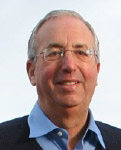The Volunteer Who Used His Corporate Positions in Service to Others — Bob Haas (Ivory Coast)
by Jeremiah Norris (Colombia 1963-65)

Bob Haas
Robert (Bob) Haas, Peace Corps Volunteer, Ivory Coast, 1964-66, subsequently served as the Chairman of Levi Strauss & Co. He is the son of Walter A. Strauss, and the great-great-grandnephew of the company’s founder, Levi Strauss. Bob received a BA degree from the University of California, Berkeley, in 1964, and a MA from Harvard Graduate School of Business in 1968. H was a White House Fellow from 1968 to 1969.
He joined Levi Strauss in 1973 and went on to serve others in a variety of corporate roles. Bob was elected to the Board of Directors in 1979, then as President and CEO in 1984, serving until he stepped down in 1999. He became Chairman of the Board in 1989 and retired from the Board in 2014. Under his leadership, Levi Strauss & Company carried out the company’s engagement in corporate social responsibility; it became the first company to define and enforce workplace and safety standards for employees.
During the Great Depression of the 1930s, Bob’s grandfather, Walter A. Haas, Sr., and great uncle, Daniel E. Koshland Sr. refused to layoff idled employees, risking bankruptcy. Instead they created work projects such as laying wooden floors in the company’s factory in San Francisco. Walter Haas Jr. and his brother Fred insisted on running integrated factories in the American South, giving equal treatment to all races during the era of segregation.
During his tenure as CEO, Bob tried to create a corporate culture in which tens of thousands of employees around the world were treated well and fairly. The company led the way in addressing a range of social and business issues. In 1982, the company became the prominent business to become involved in addressing the problems of HIV-positive employees, and created employee AIDS awareness programs. Since the early 1980s the Levi Strauss Foundation has donated over US60 million to AIDS-oriented non-profits. In 1991, Bob was the first person to be awarded the Edward N. Brandt Jr. Award from the National Leadership Coalition on AIDS for his significant efforts in the fight against HIV and AIDS in the workplace.
In 1992, Levi Strauss became the first Fortune 500 company to extend health-care benefits to the unmarried partners of its employees, starting the acceptance of this practice by other leading companies. In that same year, the company published the first-ever corporate standards governing the treatment of employees in contractor factories around the world. Since then, these guidelines have been largely adopted by the apparel and footwear industries.
Bob used his corporate position to become an active supporter of the Haas Scholars Program at University of California, Berkeley. He was a member of Berkeley’s Board of Visitors, national giving chair for the Campaign for Berkeley, a Board member of the Haas School, and in 2007, the recipient of the Chancellor’s Award. In 2008, Berkeley established the Robert D. Haas Chancellor’s Chair in Equity and Inclusion in his honor.
He served as a Trustee of the Evelyn and Walter Haas Jr. Fund, a San Francisco-based private family foundation established in 1953 with the goal to form a righteous and supportive society that offers basic rights and opportunities to all people. Bob joined the fund’s board of directors in 1992 and went on to serve as Chair of the Audit Committee. He was a former member of the Trilateral Commission, trustee of the Ford Foundation, member of the Council on Foreign Relations, and honorary trustee of the Brookings Institution, the California Business Roundtable, and the Bay Area Council. In addition, Bob is the former president of the Levi Strauss Foundation, and a donor and supporter of Immigrants Rising.
In 1998, President Clinton honored Bob with the first annual Ron Brown leadership Award in recognition of his company’s anti-racism initiatives called ‘Project Change.’ In 2009, Bob was selected as the Alumnus of the Year of the University of California, Berkeley.
It truly can be said that Bob used his corporate positions and devoted them entirely in service to others, warranting him a highly earned Profile in Citizenship.
Wow, impressive!
What did Bob Haas experience in the Ivory Coast while he was a PCV there way back in 1963-5? How does he see that time now and how it may have helped form him in his time since?.
I worked at Levi Strauss in the 1980s. Bob Haas transformed the lifestyle at headquarters and with it, our effectiveness. Like most SF corporations during that era, employees dressed conservatively, in “dress for success” mode. That is, until, Bob Haas, who was the Chief Operating Officer at the time, began showing up in jeans and a plaid shirt. It didn’t take long before “Levi’s casual” took hold. The office energy transformed, and a participative style emerged. Impromptu discussions often took place in the hallways and the floors’ coffee areas. One in particular I still remember. The Womenswear president stopped at a round table where a group of us was having coffee. “Why are we selling women’s dress shoes? he asked. There was nothing but blank stares. “I thought so,” and he walked off. Bob Haas’ concept of a successful organization was far ahead of his time.